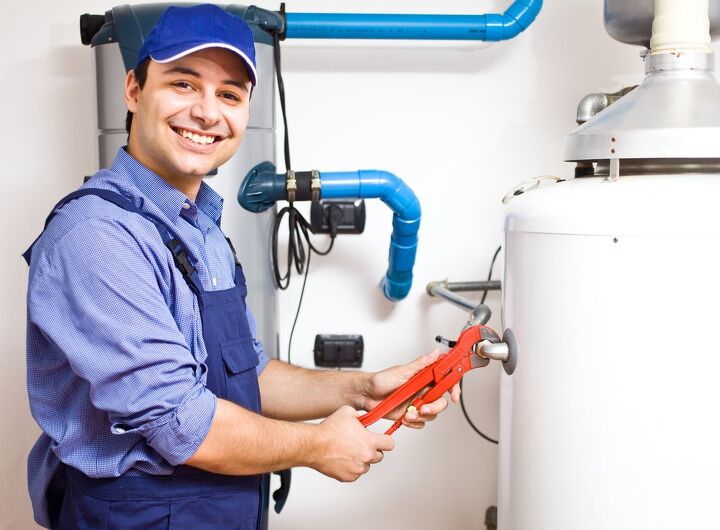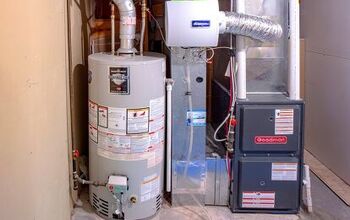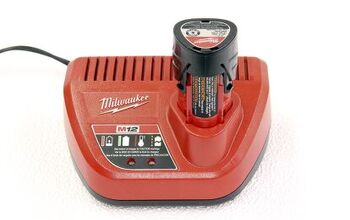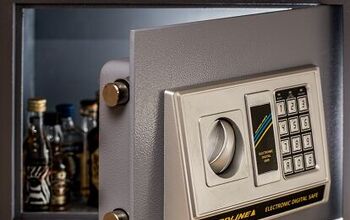4500-Watt Vs. 5500-Watt Water Heater: Efficiency & Costs

According to the Department of Energy, single family water heaters use around 17% of all household energy. This makes water heaters a huge factor in your household energy efficiency levels and corresponding energy bill ( Source).
However, most people don’t think about their water heaters until they have to. This usually means that their water heater is on its last legs and needs to be replaced—fast.
This post will address the difference between the 4500-watt water heater and the 5500-watt water heater. To cut to the chase, the biggest difference between the two is the amount of time it takes each to recover after the hot water in the storage tank has been used.
Let’s dive in.
Do You Need Water Heater Installation or Replacement?
Get free, zero-commitment quotes from pro contractors near you.

How Do I Choose A Water Heater?
If you’re on the hunt for a water heater, you’ve most likely encountered a variety of prices, styles, and energy sources. Should you buy a gas or electric water heater? What about your storage tank system—should it be short or tall? Should you go tankless?
Most people tend to buy a new water heater within the same energy source category as their last water heater. For example, if a family’s electric water heater broke, they would most likely buy an electric water heater to replace it.
This is simply because that’s the system already set up. The same would be true for a gas water heater—the previous gas water heater was already hooked up to a gas line.
Both Are Electric Water Heaters
Both the 4500-watt water heater and 5500-watt water heater are electric water heaters, denoted by the amount of electricity each uses. In order to properly set up either water heater, a circuit that can tackle that amount of electricity running through it must already be installed. For both of these heaters, a 230v 30-amp circuit should do.
Both 4500 and 5500-watt water heaters are connected to storage tanks that serve the purpose of storing the household’s water once it has been heated. For a typical American household, these storage tanks hold between 50 and 80 gallons. The size of the storage tank depends on the size of the house and the amount of people living there.
Difference Between 4500 and 5500-Watt Water Heaters
The main difference between the 4500-watt water heater and the 5500-watt water heater is the amount of time it takes to heat the water. Typically, the 4500-watt water heater heats between 18 and 25 gallons per hour. A 5500-watt water heater heats between 25 and 35 gallons per hour.
You’ve probably already done the math, but this equates to a 5500-watt water heater heating between 4 and 7 more gallons of water per hour in comparison to a 4500-watt water heater.
To be clear, the water does not get any hotter with a higher wattage water heater, nor does the water get hotter faster when it’s being run. The difference is how long the storage tank takes to heat up again once the hot water in the storage tank has been depleted.
Is a 5500-Watt Water Heater Really Worth It?
Whether or not it’s worth it to replace a 4500-watt water heater setup with a 5500-watt water heater setup depends on your personal preference and price range.
If you’re a family of four that takes multiple showers per day, uses hot water to wash dishes, and doesn’t want to wait for water to heat up in between uses, a 5500-watt water heater might be recommended for you.
The opposite would be true for a family of two that doesn’t use much hot water: a 4500-watt water heater might be just fine.
When it comes to pricing, 4500-watt water heaters cost between $329-$829, while 5500-watt water heaters cost between $479-$1,350. That being said, it’s important to note that annual operational costs for the 5500-watt water heater are more expensive. This is because a 5500-watt water heater uses more energy than a 4500-watt water heater.
Can I Replace A 4500-Watt Water Heater With A 5500-Watt Water Heater?
If you’re in the market for a new water heater, you might be asking the above question. The short answer to the question is yes, as long as you have the correct breaker and wire system set up.
If the breaker is 30 amp, then yes, a 5500-watt water heater should be fine as a replacement for a 4500-watt water heater. If you don’t have a 30-amp breaker system set up, you will need to replace the breaker before you can convert your 4500-watt water heater setup to a 5500-watt setup. A #10 wire should work for both.
Related Questions
What’s the benefit of a tankless water heater?
Unlike gas and electric water heaters, tankless water heaters do not include storage tanks. Instead, water is heated as it flows through the system. Tankless water heaters take up much less space, provide consistent heating of water (as opposed to needing to wait for the water to heat up).For that reason, they use much less energy. However, they are a much bigger up-front investment when compared to both gas and electric water heaters.
How often should I perform maintenance on my electric water heater?
It’s recommended that you get your water heater flushed out at least once per year. “Flushing” your water heater gets rid of sediment that can eventually clog your system if left untreated.Other than yearly flushing of the system, it’s not recommended that you get maintenance done unless you see leaks, water pressure is low, you hear a “clicking” sound, or your water is rusty.
How much does an electric water heater cost to operate each year?
Statistics on this question vary from source to source and the amount of use. According to SFGate and the U.S. Department of Energy, a 5500-watt electric water heater with a United Energy Factor (UEF) of 0.9 will cost between $600 and $800 to operate annually.Since a 4500-watt water heater uses less energy, it would be slightly less expensive if operated at the same frequency.
Do You Need Water Heater Installation or Replacement?
Get free, zero-commitment quotes from pro contractors near you.

Wrapping Up
As discussed above, the main difference between a 4500-watt water heater and a 5500-watt water heater is how fast it takes the water heater to recover once the storage tank has been depleted.
The amp, breaker, and wire system that one has in place most likely will work for both wattages, although this varies on a case by case basis.
Related Guides

We are a team of passionate homeowners, home improvement pros, and DIY enthusiasts who enjoy sharing home improvement, housekeeping, decorating, and more with other homeowners! Whether you're looking for a step-by-step guide on fixing an appliance or the cost of installing a fence, we've here to help.
More by Upgraded Home Team













![10 Best Scroll Saws for 2022 [Ultimate Reviews & Buyer's Guide]](https://cdn-fastly.upgradedhome.com/media/2023/07/31/9070684/10-best-scroll-saws-for-2022-ultimate-reviews-buyer-s-guide.jpg?size=350x220)













